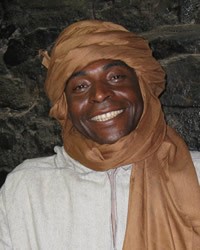Tuareg, Tahaggart in Algeria

Photo Source:
Jacqueline Macou - Pixabay
|
Send Joshua Project a map of this people group.
|
| People Name: | Tuareg, Tahaggart |
| Country: | Algeria |
| 10/40 Window: | Yes |
| Population: | 77,000 |
| World Population: | 156,000 |
| Primary Language: | Tamahaq, Tahaggart |
| Primary Religion: | Islam |
| Christian Adherents: | 0.07 % |
| Evangelicals: | 0.07 % |
| Scripture: | Portions |
| Ministry Resources: | Yes |
| Jesus Film: | No |
| Audio Recordings: | No |
| People Cluster: | Tuareg |
| Affinity Bloc: | Arab World |
| Progress Level: |
|
Introduction / History
Tuaregs of Algeria are part of a larger group of Berber-speaking Tuaregs. They are nomads who raise cattle and live in an area that stretches across North Africa. This territory extends from Western Sahara to the northern portion of Western Sudan.
Although the origin and early history of the Tuaregs are cloudy, these tribal nomads appear to have traveled down from North Africa in a series of migrations as early as the 7th century. By the end of the 14th century, Tuareg tribes had established themselves as far south as the Nigerian border.
The chief characteristics of the Tuaregs include the unity of their language, their alphabet (which uses tifinagh characters), their complex social organization, and their class structure.
There are Tuaregs in Algeria who speak Algerian Arabic. They blend in better with the general population of Algeria than the Tahaggart Tuareg who speak the Tahaggart Tamahaq language. This language is dying so they will probably be speaking a different language in two generations.
What Are Their Lives Like?
The Tahaggart Tuareg primarily live in small nomadic groups. Their camps consist of five or six portable tents arranged in a tight circle. Each tent is made of 30 or 40 tanned skins that have been dyed red and sewn together. The skins are supported on a framework of wooden poles and pegged into the ground.
Each tribe is governed by a chief and an assembly of adult males. The tribes are grouped into three confederations, each with its own sheik and council of rulers. These three confederations are under the leadership of one paramount chief, called an amenokal, and a council of nobles. Succession to headship is matrilineal (passed down through the lineage of the women).
Tahaggart Tuareg society also has an elaborate structure. The main division is between the noble class and the various serf classes. In most Tuareg groups, there are also whole tribes of ineslemen or marabouts. These are "holy people" who, like other tribes, are led by their own chiefs. Among some of the Berbers such tribes are different from ordinary men. They are believed to possess the powers of protection and healing, even after death.
The lowest class does both the manual and domestic labor. This class is made up of ethnically mixed peoples who live in a cooperative relationship with their masters, the Tuareg. Many were originally slaves, either taken during warfare or bought at Indonesian slave markets. Three slave groups in the lower class are the iklan, the inaden, and the harratin. The iklan take care of herding, cooking and other domestic chores. The inaden work as artisans and blacksmiths for the Tuaregs. The harratin are tenant farmers who work as sharecroppers. Sadly, the Tuaregs have very little respect for these groups.
The Tahaggart Tuareg are primarily shepherds. Each tribe holds collective property rights on special grazing grounds. They also do a small amount of farming on this land, using irrigation and hand-held hoes. Their main crop is wheat, but they also grow some barley and grain, dates, figs, apricots, grapes and several vegetables. Although they raise camels, donkeys, sheep, and goats, they only eat meat at feasts. Milk, both fresh and sour, is a staple food and is used to make butter and cheese.
Veils worn by Tuareg men are called tidjelmoust. The most preferred veils are dyed indigo. To show respect, the men always cover their mouths, noses and foreheads in the presence of foreigners and their in-laws. However, many men often leave their faces uncovered in family camps or while traveling.
What Are Their Beliefs?
Though the Tuaregs are virtually all Sunni Muslims, they have a reputation among other Muslims for being lukewarm in their faith. They practice a passive form of Islam infused with folk beliefs and magic. Protective charms or amulets are commonly worn, and belief in spirits is widespread. There are several Marabouts (those of the "holy class") living among them, some of whom run Islamic schools.
What Are Their Needs?
There are so few Algerian Christ followers that it will take a miracle of God to reach the Algerian Tuareg community. Who will live among them, show them love and respect, and take Christ to this group?
Prayer Points
Ask the Lord to send loving Christians from other parts of Africa to Algeria to share Jesus Christ with the Tuareg tribes.
Pray that God will open the hearts of Algeria's governmental leaders to the gospel.
Ask the Lord to raise up a network of fellowships among the Tuareg tribes of Algeria.